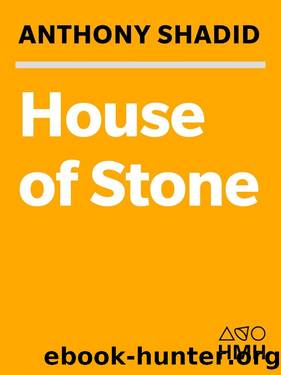House of Stone: A Memoir of Home, Family, and a Lost Middle East by Anthony Shadid

Author:Anthony Shadid [Shadid, Anthony]
Language: eng
Format: epub
Publisher: Houghton Mifflin Harcourt
Published: 2012-02-28T08:00:00+00:00
It was 1920—the Year of the Twenty, it was called. No one in Marjayoun would ever have imagined what had transpired. Perhaps Isber and Bahija believed their daughter could or would forget them. Maybe that was what they hoped for her.
In his daughter’s bag, Isber put the sack, tied even more tightly than Nabeeh’s, filled with the gold pieces he still had from selling wheat in the Houran during the war. Bahija gave her yet more gold jewelry, knowing that she could sell it any time. “Take care of yourself,” they said to her, over and over.
She could not speak or say goodbye. She cried, but could not say the words she felt to her parents. She was leaving home, the olive trees that she had played near, the fig tree that she had eaten from, the stone wall that she had climbed.
Bahija said, “God be with you.” She repeated it one last time as the horse and buggy departed the house with the olive trees, carrying her daughter, the girl who would become my grandmother. “God be with you.”
So many had said goodbye to Lebanon and Marjayoun by this day in 1920. Who would notice that Raeefa Samara, attempting not to show her feelings, found herself, though tall for a twelve-year-old, not up to the attempt. As the buggy she shared with her aunt and uncle pulled away from her parents, as Raeefa left the home of Isber and Bahija for perhaps the last time, the young girl proved herself unpracticed at composure. No glance at Aunt Raheeja or Uncle Mikhail was necessary to see their discomfort as they left Marjayoun for, first, Beirut, then Marseilles, and then America. But their sternness was not unpredictable. Emotional displays unsettled the world. Restraint, like proper clothing, concealed and silenced vanity. Eyes of girls were not to gaze directly, but to take in, briefly, what was expected.
Her aunt and uncle were not leaving children behind, but joining them, already in Oklahoma and doing well. And so the buggy plodded toward Qlayaa, a string of mud huts along the ridge of a hill shared with Marjayoun. As that village drifted off, the road bent three times, at its steepest elevation, then flattened as it descended toward the Litani River. Then they saw Beaufort Castle, known in Arabic as Shaqeef. A Crusader fort perched 2,100 feet above the sea, it sat improbably at the valley’s summit. Behind Raeefa was Saint Elijah’s, hugging a rock outcropping that looked as though a flood had swept away everything beneath it. The road tilted and turned, sliding down the valley and its sides of boulders stacked one on top of the other, until they reached the Khardali Bridge. An ancient frontier beneath Beaufort, it opened to a majestic view of the valley, as beautiful as it was lonely, hardly an inhabitant along its irrigated fields of cantaloupe, watermelon, carrots, and corn.
Saint Elijah’s was still visible, like a sentinel. So was Mount Hermon and the frontier of Palestine, the Houran, and Syria beyond it.
Download
This site does not store any files on its server. We only index and link to content provided by other sites. Please contact the content providers to delete copyright contents if any and email us, we'll remove relevant links or contents immediately.
Hit Refresh by Satya Nadella(8338)
When Breath Becomes Air by Paul Kalanithi(7264)
The Girl Without a Voice by Casey Watson(7263)
Do No Harm Stories of Life, Death and Brain Surgery by Henry Marsh(6336)
A Court of Wings and Ruin by Sarah J. Maas(6076)
Hunger by Roxane Gay(4218)
Shoe Dog by Phil Knight(4167)
Everything Happens for a Reason by Kate Bowler(4067)
A Higher Loyalty: Truth, Lies, and Leadership by James Comey(4033)
The Rules Do Not Apply by Ariel Levy(3906)
Tuesdays with Morrie by Mitch Albom(3832)
The Immortal Life of Henrietta Lacks by Rebecca Skloot(3826)
How to Change Your Mind by Michael Pollan(3679)
Millionaire: The Philanderer, Gambler, and Duelist Who Invented Modern Finance by Janet Gleeson(3569)
All Creatures Great and Small by James Herriot(3516)
Elon Musk by Ashlee Vance(3455)
Tokyo Vice: An American Reporter on the Police Beat in Japan by Jake Adelstein(3440)
Man and His Symbols by Carl Gustav Jung(3315)
The Money Culture by Michael Lewis(3284)
